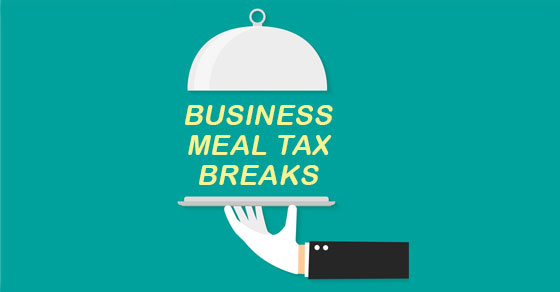The coronavirus (COVID-19) has been hard on many businesses, but particularly the restaurant and entertainment industry has been hit hard.
One potential aide for these businesses comes in the form of a proposed tax break by President Trump that would enhance the current deductibility of meals and entertainment on tax returns.

While this could help improve spending in these industries, it could also help you no matter your industry by providing increased deductions.
It’s unclear whether Congress would go along with enhanced business meal and entertainment deductions. But in the meantime, let’s review the current rules.
Before the pandemic hit, many businesses spent money “wining and dining” current or potential customers, vendors and employees. The rules for deducting these expenses changed under the Tax Cuts and Jobs Act (TCJA), but you can still claim some valuable write-offs. And keep in mind that deductions are available for business meal takeout and delivery.
One of the biggest changes is that you can no longer deduct most business-related entertainment expenses. Beginning in 2018, the TCJA disallows deductions for entertainment expenses, including those for sports events, theater productions, golf outings and fishing trips.
50% meal deductions
Currently, you can deduct 50% of the cost of food and beverages for meals conducted with business associates. However, you need to follow three basic rules in order to prove that your expenses are business related:
- The expenses must be “ordinary and necessary” in carrying on your business. This means your food and beverage costs are customary and appropriate. They shouldn’t be lavish or extravagant.
- The expenses must be directly related or associated with your business. This means that you expect to receive a concrete business benefit from them. The principal purpose for the meal must be business. You can’t go out with a group of friends for the evening, discuss business with one of them for a few minutes, and then write off the check.
- You must be able to substantiate the expenses. There are requirements for proving that meal and beverage expenses qualify for a deduction. You must be able to establish the amount spent, the date and place where the meals took place, the business purpose and the business relationship of the people involved.
It’s a good idea to set up detailed recordkeeping procedures to keep track of business meal costs. That way, you can prove them and the business connection in the event of an IRS audit.
Other considerations
What if you spend money on food and beverages at an entertainment event? The IRS has clarified that taxpayers can still deduct 50% of food and drink expenses incurred at entertainment events, but only if business was conducted during the event or shortly before or after. The food-and-drink expenses should also be “stated separately from the cost of the entertainment on one or more bills, invoices or receipts,” according to the guidance.
Another related tax law change involves meals provided to employees on the business premises. Before the TCJA, these meals provided to an employee for the convenience of the employer were 100% deductible by the employer. Beginning in 2018, meals provided for the convenience of an employer in an on-premises cafeteria or elsewhere on the business property are only 50% deductible. After 2025, these meals won’t be deductible at all.
Plan ahead
The TCJA already complicated the treatment of meal and entertainment expenses. Now, while potential changes to meals and entertainment could be beneficial, the change could still create complications. To stay updated on the status of these and other potential changes, please contact your Rudler, PSC advisor at 859-331-1717. We can also help with any current questions you have on the deductibility of meal and entertainment expenses.
RUDLER'S TAX MANAGEMENT & PLANNING TEAM
This week's Rudler Review is presented by Becca Johnson, Staff Accountant and John Wood, CPA, CVA.
If you would like to discuss your particular tax situation, contact Becca or John at 859-331-1717.


Rudler PSC has established a Tax Management and Planning Team, a group of professionals who specialize in tax services. These highly qualified and experienced tax specialists meet on a regular basis to discuss upcoming client engagements, current issues relating to our clients and regulatory changes. Be sure to receive future Rudler Reviews for advice from our tax experts, sign up today !